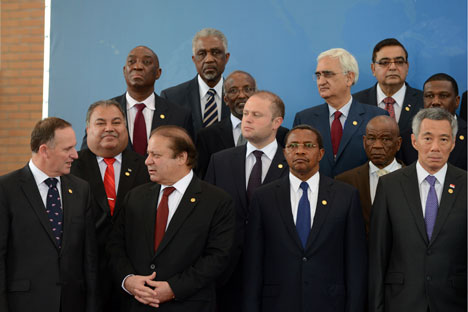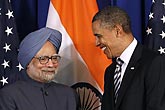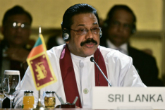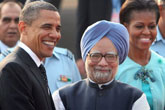What has India lost and gained by Manmohan Singh not attending CHOGM?

The Indian prime minister was conspicuous by his absence. Source: AP
The Commonwealth Heads of Government Meeting (CHOGM), which was held on November 15-17 in Colombo, was surrounded by an aura of scandal long before it started. The refusal of the Indian Prime Minister to participate in the summit was a sharp political gesture, but its consequences may be quite different from what the Indian government expects.
Canadian Prime Minister Stephen Harper was the first head of government to announce his non-participation in the summit, explaining his refusal to come to Sri Lanka by the unsatisfactory situation of human rights in that country and the government's reluctance to investigate cases of violation of these rights during the Civil War of 1983-2009.
The two leading Tamil political parties in India – All India Anna Dravida Munnetra Kazhagam (AIADMK) and Dravida Munnetra Kazhagam (DMK), demanded that the government of India support the boycott. After all, their appeals did have had their effect, and a few days before the summit, Prime Minister Manmohan Singh refused to go to Colombo by sending External Affairs Minister Salman Khurshid there. The last of the Heads of Government to decide to skip the summit was Premier Navin Ramgoolam of Mauritius.
The civil war in Sri Lanka, which lasted for more than a quarter of a century, is estimated to have claimed the lives of 100,000 people. The country’s economy has suffered tremendously from this damage. During the war, both sides admitted violations of human rights.
In India alone there are about 60 million Tamils, which is almost three times the entire population of Sri Lanka. A number of the Tamil Diaspora living in the West, Africa and Southeast Asia numbers about 10 million. This diaspora is very influential. During the war years, Tamil mafia groups imposed levies upon the Tamil entrepreneurs in order to raise money to continue the war.
Nevertheless, the fact that human rights violations were committed by both sides, is suppressed. Meanwhile, it was the Liberation Tigers of Tamil Eelam (LTTE) who invented such tactics of terrorism such as the use of suicide bombers. Moreover, until the well known events of September 11, 2001 it was the Tigers and not the Islamists who were responsible for most of the terrorist attacks committed in the world, and now they are trying to shift the responsibility for civilian casualties to government troops.
Finally, let us not forget that it was the Tamil Tigers in the 1991 who killed the former Prime Indian Minister Rajiv Gandhi.
The explanation of why Manmohan Singh decided to not attend the summit is actually very simple. In six months’ time in India, general elections will be held, and the prospects of the ruling INC do not look too bright. None of the major national parties, is likely to be able to single-handedly achieve a majority in parliament. This puts the question of the need of alliance with leading regional parties on the agenda. Tamil Nadu will play one of the leading roles in the future balance of power, and that is why the government and the Prime Minister Manmohan Singh gave way to the pressure of the Tamil political parties.
So what's next?
It is obvious that this political gesture of the Government of India has already been perceived negatively in Sri Lanka and can only cause anti-Tamil and anti-Indian attitudes in the country. This increases the likelihood of a new inter-ethnic violence, that is, measures designed to influence the government, in fact, will have the opposite effect and lead to a deterioration of the situation of minorities, whose rights India is fighting for.
There is another danger associated with Sri Lanka’s role in the big geopolitical game in the Indian Ocean. This island, located in a strategically important region, and is exactly half-way on the route of hydrocarbons transportation from the Middle East to Southeast Asia and beyond the Asia Pacific Region, has long attracted the attention of world powers. Recently China has increased its influence in Sri Lanka. China has built the Hambantota port in the south and upgraded the terminals at the Port of Colombo, and the island has made the so-called “string of pearls” the most important part of its strategy, whose purpose is not only to control the routes of sea transportation of goods but also the Indian maritime environment.
In this context, unfriendly gestures from the government of India can only push Sri Lanka to an even closer cooperation with China.
Thus, trying to win a tactical victory in the country and attract the people of Tamil Nadu and Tamil politicians (by the way, success is far from guaranteed) , the Indian government only exacerbates the problem of the Tamil population of Sri Lanka and risks incurring serious strategic loss in the international arena.
In this situation, focusing on something else would appear to be much more efficient. The economy of the north and east of Sri Lanka is in dire need of investment. And if the Indian Tamils and the Tamil Diaspora of the West, raised funds for the restoration of these areas with the same zeal, as in the recent past – for the war, this would have been a much greater contribution to the support of the Tamils of Sri Lanka. However, political gestures like the prime minister not attending the summit are unlikely to contribute to the normal course of the process.
All rights reserved by Rossiyskaya Gazeta.
Subscribe
to our newsletter!
Get the week's best stories straight to your inbox


